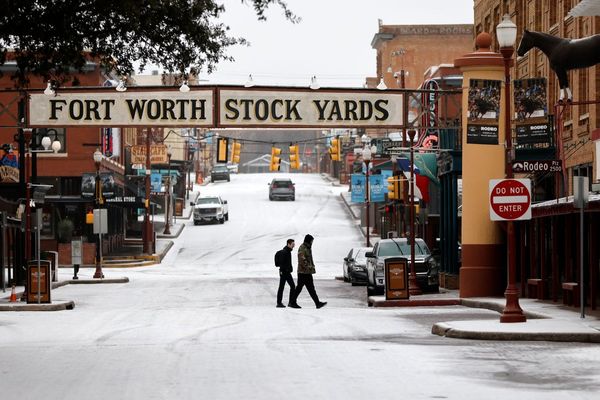
A deputy commander of the Russian navy who had previously led one of the military’s most notorious brigades has been killed near the frontline with Ukraine, Moscow has confirmed.
Maj Gen Mikhail Gudkov, who was responsible for Russia’s marine units, was killed on Wednesday in a Ukrainian missile attack on a field headquarters in the Kursk region, amid reports the position had been revealed by poor security.
Oleg Kozhemyako, the governor of Primorsky Krai in Russia’s far east, said Gudkov had died “performing his duty as an officer alongside his fellow soldiers” and that despite his rank, he “continued to personally visit the positions of our marines”.
Russia’s ministry of defence confirmed later that Gudkov had been killed “during combat operations” in the border areas of Kursk region on Wednesday, though there were some reports on social media that the attack had happened a day earlier.
Reports of Gudkov’s death came as Vladimir Putin told Donald Trump during a telephone call that Russia was not ready to negotiate over the “root causes” of its invasion of Ukraine, indicating that Moscow was unlikely to grant concessions during ceasefire talks in the near future.
“Our president said Russia will be seeking to achieve its goals, ie the elimination of the universally known root causes which led to the current situation, the current acute confrontation,” said the Russian presidential aide Yuri Ushakov during a conference call with journalists. “Russia will not abandon these goals.”
Putin had previously defined the “root causes” of the conflict as a series of developments in the post-Soviet space since 1991, including the expansion of Nato to eastern Europe, Ukraine’s desire to join western economic and security blocs, and the country’s independent foreign and military policy.
Russia did say it was ready to continue negotiations directly with Ukraine, but many of Russia’s demands are seen as non-starters in Kyiv, particularly three years into a war that some studies claim has killed or wounded more than 1 million soldiers and left all of Ukraine’s major cities scarred by deadly Russian missile and drone strikes.
After the call, Trump said he had made no progress with Putin towards a ceasefire in Ukraine, adding that he was “not happy” about the war.
Gudkov had been personally promoted by Putin in March, having led the 155th Marine Brigade, a frontline unit repeatedly reconstituted because so many of its members had been killed.
A Russian Telegram channel, MiG 41, said that according to “unofficial information” the base may have been revealed by a mole, or discovered by Ukrainian military intelligence after some marines called family and friends in Vladivostok as the eastern city began to celebrate its city day on Wednesday.
At least four missiles were said to have struck the base, a city publication reported, and a number of other senior officers were killed in the attack near the village of Korenevo in the Kursk region, about 19 miles (30km) from the front.
A social media posting from a Russian servicemen’s organisation said more than 10 others were killed alongside him, including the brigade’s new commander.
Members of the 155th brigade, originally considered an elite unit, have been accused of war crimes by Kyiv during the course of the war, such as the execution of nine Ukrainian prisoners of war in the Kursk region last summer. A captured Russian marine said he had witnessed the killing of two other PoWs a month earlier in the same sector.
The Russian unit participated in the failed attempt to take Kyiv in spring 2022, and was then involved in the repeated offensives at Vuhledar in 2023 in the south-east corner of the frontline, before being redeployed to fight off Ukraine’s incursion into Russia’s Kursk province.
Gudkov is one of at least 10 Russian major generals or lieutenant generals to have been killed in the war so far. Some of the attacks appear carefully planned by Ukraine, though on the evidence so far the hit on Gudkov looks opportunistic.
Lt Gen Igor Kirillov, the head of the Russian military’s chemical, biological and radiological weapons unit, was killed after a bomb detonated outside his apartment in December. Ukraine’s SBU security service claimed responsibility for the operation.
In April, Yaroslav Moskalik, the deputy head of the main operations directorate of the general staff of the Russian armed forces, died after a car exploded in the town of Balashikha outside Moscow in April. Though Ukraine did not say it was behind this attack, the Ukrainian president, Volodymyr Zelenskyy, praised the country’s foreign intelligence for the killing of top Russian military figures.
An explosion on Thursday also killed Manolis Pilavov, a former mayor of the Russian-occupied Ukrainian city of Luhansk, Russian authorities said. Pilavov ran the city’s administration for nine years after it was separated from Ukraine in 2014 and was wanted by Kyiv for violating the integrity of the country.
Across Ukraine, three people were reported killed and 34 injured in Russian air attacks in different parts of the country on Thursday. Ukraine’s air force said 52 Shahed and dummy drones were launched by Moscow’s forces, with it successfully intercepting or jamming 40 of them.
Earlier this week, it emerged that the US had paused the delivery of Patriot air defence missile interceptors and other precision weapons to Ukraine amid concerns about the level of its stockpiles. Trump said last month that Patriot missiles had been given to Israel to help it defend itself from Iran.
The US president and Zelenskyy were expected to discuss the issue on Friday, the Financial Times reported. Zelenskyy said on Wednesday: “One way or another, we must ensure protection for our people.”







